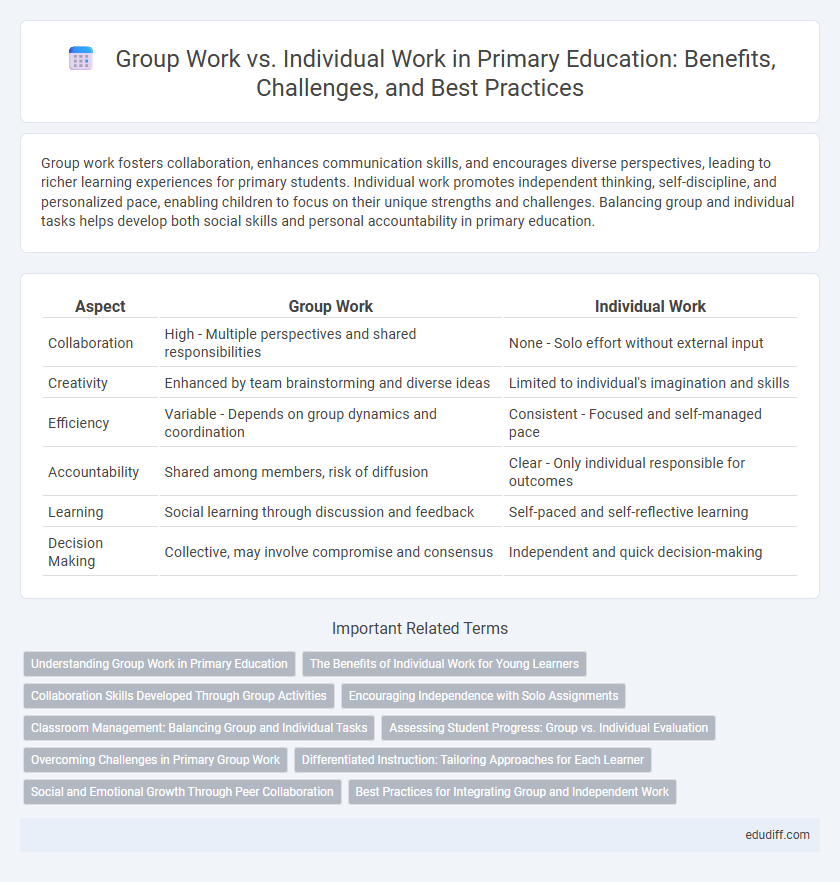Group work fosters collaboration, enhances communication skills, and encourages diverse perspectives, leading to richer learning experiences for primary students. Individual work promotes independent thinking, self-discipline, and personalized pace, enabling children to focus on their unique strengths and challenges. Balancing group and individual tasks helps develop both social skills and personal accountability in primary education.
Table of Comparison
| Aspect | Group Work | Individual Work |
|---|---|---|
| Collaboration | High - Multiple perspectives and shared responsibilities | None - Solo effort without external input |
| Creativity | Enhanced by team brainstorming and diverse ideas | Limited to individual's imagination and skills |
| Efficiency | Variable - Depends on group dynamics and coordination | Consistent - Focused and self-managed pace |
| Accountability | Shared among members, risk of diffusion | Clear - Only individual responsible for outcomes |
| Learning | Social learning through discussion and feedback | Self-paced and self-reflective learning |
| Decision Making | Collective, may involve compromise and consensus | Independent and quick decision-making |
Understanding Group Work in Primary Education
Group work in primary education fosters collaboration, communication, and social skills while enhancing cognitive development through peer interaction and shared problem-solving. It promotes active learning by encouraging students to articulate ideas, listen to diverse perspectives, and negotiate meaning, which deepens comprehension compared to individual tasks. Research shows that primary students engaged in structured group activities demonstrate improved critical thinking and retention of concepts, making group work a valuable pedagogical approach.
The Benefits of Individual Work for Young Learners
Individual work fosters independence and self-discipline in young learners by allowing them to focus on personal strengths and areas for growth without peer influence. It promotes personalized learning experiences that cater to a child's unique pace and style, enhancing retention and comprehension. Developing problem-solving skills and self-assessment abilities during individual tasks prepares students for future academic challenges and lifelong learning.
Collaboration Skills Developed Through Group Activities
Group work fosters essential collaboration skills such as communication, conflict resolution, and teamwork, which are critical for personal and professional growth. Students engaged in group activities learn to listen actively, share responsibilities, and respect diverse perspectives, enhancing their social and cognitive development. These collaborative experiences build a foundation for effective problem-solving and leadership in real-world situations.
Encouraging Independence with Solo Assignments
Solo assignments in primary education foster independence by allowing students to develop problem-solving skills and self-reliance. Individual work encourages critical thinking and personal accountability, helping children build confidence in their abilities. This approach complements group activities by providing opportunities for focused, self-directed learning.
Classroom Management: Balancing Group and Individual Tasks
Effective classroom management requires balancing group and individual tasks to promote student engagement and accountability. Implementing structured group work alongside individual assignments helps develop collaboration skills while allowing personalized learning and assessment. Clear expectations and consistent routines support smooth transitions and minimize disruptions, enhancing overall classroom productivity.
Assessing Student Progress: Group vs. Individual Evaluation
Assessing student progress through individual evaluation provides clear insight into each learner's understanding and personal skill development, enabling precise identification of strengths and weaknesses. Group work assessment highlights collaborative skills and collective problem-solving abilities, promoting teamwork and communication competencies crucial in real-world scenarios. Combining both methods ensures a comprehensive evaluation by measuring individual accountability alongside cooperative learning dynamics.
Overcoming Challenges in Primary Group Work
Effective collaboration in primary group work enhances communication skills and fosters problem-solving abilities among young learners. Overcoming challenges such as differing opinions and uneven participation requires structured guidance and clear role assignments to ensure inclusivity and engagement. Teachers play a critical role in mediating conflicts and encouraging cooperative behavior to build a supportive learning environment.
Differentiated Instruction: Tailoring Approaches for Each Learner
Group work fosters collaborative skills and allows students to learn from diverse perspectives, enhancing social interaction and communication. Individual work enables personalized pacing and targeted skill development, catering to specific learner needs and ensuring mastery of content. Differentiated instruction balances these methods, using group collaboration to build social-emotional skills while providing individualized tasks that address unique learning styles and abilities.
Social and Emotional Growth Through Peer Collaboration
Group work fosters social development by encouraging communication, empathy, and conflict resolution among primary students. Collaborative tasks enhance emotional intelligence as peers provide support and diverse perspectives, promoting self-awareness and mutual respect. Individual work, while valuable for independent skills, lacks the dynamic interpersonal interaction that strengthens social bonds and emotional maturity in early education.
Best Practices for Integrating Group and Independent Work
Combining group work with individual tasks enhances student engagement and deepens understanding by balancing collaboration and personal accountability. Effective strategies include assigning roles within groups to ensure active participation and providing clear guidelines for independent reflection to reinforce learning. Integrating formative assessments that capture both group dynamics and individual contributions supports tailored feedback and skill development.
Group Work vs Individual Work Infographic

 edudiff.com
edudiff.com